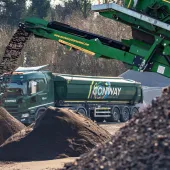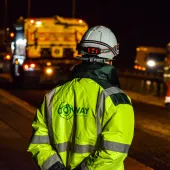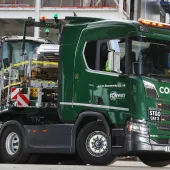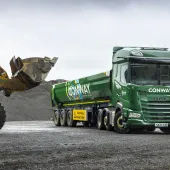Gully waste overlooked and undervalued
FM Conway urge UK highways sector to focus on recycling and reusing more gully waste
ACCORDING to Tristan Miles, director of cleansing & traffic management at FM Conway, improving resource efficiency across UK highways calls for a greater focus on recycling and reusing the valuable waste streams that are still being sent to landfill.
He said if there was a European league table for highways material recycling, the UK would probably occupy a position of mid-table mediocrity. This performance needs to improve if the sector is to embrace the environmental and fiscal benefits of a circular economy.
The industry has undoubtedly improved its ability to recycle asphalt planings, thanks to higher landfill costs, a greater acceptance of recycled materials and investment in plant infrastructure. But the sector is still failing to recover, treat and reuse all waste streams produced by the maintenance and construction of the local and strategic network.
This failure is hampering our ability to fully embrace a circular economy, damaging environmental performance and meaning that local authorities and network operators are still paying high landfill costs to dispose of materials that could be recycled and reused.
Gully waste is a prime example of a waste stream that is not being fully maximized. Every year high volumes of gully waste arisings are produced as a result of ongoing maintenance of the trunk and local road networks. This waste typically consists of sand and gravel, leaves and other organics, aggregates and litter.
These arisings have traditionally been either sent straight to landfill or dewatered. With landfill costs now standing at £72 a tonne and the tariff set to rise to £80 a tonne in 2014, there is a fiscal incentive to take a more sustainable approach.
Why is more gully waste not being recycled? First, there has been a lack of investment in processing plants that are able to undertake the separation, filtration and screening of constituent materials to produce higher value products.
Secondly, a lack of legislative clarity has also hindered the growth of the sector. This was finally resolved last year with the publication of the Environment Agency’s (EA) ‘Recovery of Street Sweepings and Gully Emptyings’ guidance, which clarifies the types of waste that qualify as non-hazardous. It also outlines inert material and the permissible disposal routes for both treated and untreated street sweepings and gully waste.
Critically, this guidance note clearly highlights that untreated street sweepings and gully emptyings have limited or expensive routes for disposal. Worryingly, a number of local authorities have raised concerns to the Local Authority Recycling Advisory Committee (LARAC) that the guidelines could leave them exposed to additional financial burdens.
These councils have failed to recognize the environmental benefits as well as the opportunity to unlock the commercial value of these materials if they are collected and treated correctly.
FM Conway’s approach to recycling gully waste is a good example of the treatment options that are available to local authorities and network operators. The company has continued to invest in our recycling infrastructure to ensure that we can recover and treat highways waste streams.
FM Conway currently clean more than one million road gullies a year on behalf of local authorities and network operators to ensure that drainage systems remain operational and this waste stream is reused.
The company’s drainage treatment plant was opened in 2004 to recycle gully waste and this state-of-the-art facility is the first plant in the UK to be developed under the new IPPC (Integrated Pollution Prevention and Control) permitting system. Gully waste is collected using our own dedicated fleet of gully suction tanks and transported to the drainage treatment plant where it is treated using a system of separation, filtration and screening to make the majority of constituents suitable for reuse.
The plant can process around 45,000 tonnes of waste per annum, from which FM Conway recycle approximately 100% of arisings. The facility is linked to an aggregate washing plant to ensure that any recovered sand and stone (approximately 45% of gully waste) is separated, diverted and screened for reuse in the production of our concrete.
Hydrocarbons are separated out and burnt offsite to produce energy. Organics and litter are the only constituents sent, at present, to landfill. This treatment and recycling process is also extremely water efficient.
The drainage treatment plant provides all the water required for the aggregates washing plant via a closed loop system whereby all the water used is recovered, re-circulated and reused. Each year, we extract, recycle and use nearly 9 million litres of water in the aggregate washing plant and in our mobile concrete batching vehicles, saving 2.4 million gallons of mains water.
Mr Miles said that to ensure that the highways industry fully contributes to a UK circular economy, businesses must collectively drive the resource efficiency agenda. This requires the sector to improve its ability to collect and treat valuable waste streams such as gully waste.
Against a backdrop of tighter environmental legislation and financial implications for sending these materials to landfill, local authorities and network operators cannot overlook this under-utilized waste stream anymore.









